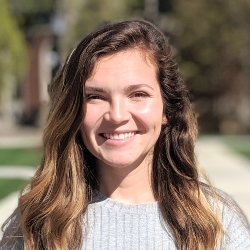The President’s Distinguished Graduate Student Scholarship
The President’s Distinguished Graduate Student Scholarship, established in 2020, is designed to assist graduate students with the direct costs of their education and is based on student academic achievement and research potential. This scholarship, valued at $17,500, is awarded to current and incoming students in University of Winnipeg graduate programs.
 Sophia Brown – Bioscience, Technology and Public Policy
Sophia Brown – Bioscience, Technology and Public Policy
Receiving the President’s Distinguished Graduate Student Scholarship is an honor, and it will help me as I start my studies in Bioscience, Technology, and Public Policy. Coming from the United States, this scholarship will aid me tremendously with my transition to Canada. I will be researching bats and the fungal disease called white nose syndrome (WNS) in Dr. Craig Willis’s lab. Specifically, I will be tracking bats during their active season, when they are not hibernating. This is a critical time for bats to build up enough fat reserves to survive winter hibernation with WNS, as the disease kills bats during this time by depleting these fat reserves. I plan to study bat movements and foraging patterns in order to address knowledge gaps and to hopefully help inform management practices. I became interested in white nose syndrome research when I learned about the disease working with bats as a field technician. WNS has killed millions of bats in North America since its introduction. Many scientists have been completing novel and impactful research on the disease, and I am excited to join in on this research.
Dana Hickson – Criminal Justice
I was inspired to apply for this award because research potential is weighed much more heavily than many of the other awards or scholarships I came across during my first year of graduate school. As graduate students, I think many of us are excited about conducting our own independent research, and to be recognized for the research potential of our proposed work is truly an honor.
Receiving this award not only gives me the confidence and reassurance that I have the research potential to succeed in graduate school, but it also alleviates some of the financial burden while completing my studies full time. Receiving this award has been instrumental toward my success in the MA Criminal Justice program both symbolically and materially. As Grad students, I think many of us struggle to cope with the challenges of living up to the expectations of the department, the university, and ultimately yourself. In many ways, this award signals that I am living up to those expectations, and I couldn’t be more grateful to my professors and to the selection committee.
I am fortunate enough to be working under the supervision of Dr. Bronwyn Dobchuk-Land and Dr. Kelly Gorkoff from the department of criminal justice. My research is going to investigate the ways in which local Winnipeg sex workers’ rights organizations position their advocacy in light of the Protection of Communities and Exploited Persons Act which was enacted in December of 2014. The PCEPA formally criminalizes the purchase of sexual services. This project will look at the political engagement from these advocacy groups and their “claims making activities” while trying to distinguish themselves from the dominant anti-trafficking/anti-sex work discourse. This type of research is not only timely, but it is also important due to the limited amount of sex work research that exists within the Winnipeg context. Investigating and documenting the important work that is being done by sex worker advocacy groups is worthy endeavor as we map the changing landscape of the law and the criminal justice response to a group that has been historically criminalized and disenfranchised.
First and foremost, I need to thank all of the wonderful professors who have deeply impacted my life during my time at the University of Winnipeg. The department of Criminal Justice is truly a hidden gem among all Canadian Universities, and I am so grateful to be completing my Master’s degree here. Specifically, I need to thank Dr. Gorkoff, Dr. Dobchuk-Land, Dr. Weinrath, Dr. Walby, Dr. Kohm, Dr. Bertrand, and Dr. Maier from the department of Criminal Justice, and a special shout out to Dr. Ducey from the department of Sociology. Each and every one of these professors have been instrumental in my success in graduate school. If not for their continued support and encouragement, I would not be on this wonderful journey. I am honoured to be a part of this program and to have received this award.
 Breanna Meek – Bioscience, Technology, and Public Policy
Breanna Meek – Bioscience, Technology, and Public Policy
I have worked very hard to achieve high academic standing. This award was the opportunity to showcase my research and academic potential and allow me to focus on my research while also building my CV to demonstrate my academic potential.
I am currently working with Dr. Renee Douville, studying the effect of endogenous retrovirus-K integrase expression on the brain, in hopes of finding an association between ERVK integrase and neurodegeneration in ALS.
I have always been interested in microbiology and human health. Working on my project has allowed me to make an impact on the lives of patients with ALS. I hope with more ALS research we will find a new treatment for patients.
My family and friends have been very supportive of me which has allowed me to pursue graduate studies. My supervisor, Dr. Douville, and my fellow graduate student, Ilena Benoit, have both been very helpful and supportive in my research career.
 Vrushang Patel – Applied Computer Science and Society
Vrushang Patel – Applied Computer Science and Society
My name is Vrushang Patel. I come from magical city Ahmedabad (India). It’s a big honor for me as a President’s Distinguished Graduate Student Scholarship Award holder. My Professor Dr. Sheela Ramanna gave me inspiration to apply for this prestigious award. Currently I am Thesis student in Applied Computer Science Department. My Research interests are Machine Learning, Deep Learning and Computer Vision. My research is using Natural Language Processing (NLP) and Granular Computing (Tolerance Rough Sets) to develop a semi-supervised learning method to automate the process of coding large volume of public tweets related to covid-19. My research will entail the development of a modified version of the Tolerant Pattern Learner (TPL) to perform content analysis on twitter interactions. Our semi-supervised approach will require very few labelled data and will generate labels after learning from previous data so it will reduce the requirements of labelled data. I want to say special thanks to Dr. Sheela Ramanna, Dr. Anil Suthar and Prof. Talal Halabi who make it possible for me. This Award gave me financial support so that I can focus on my research which is very important in student life.